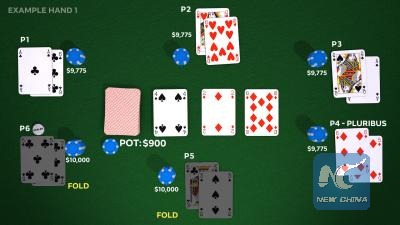
This is the interface used during the experiment with Pluribus and the professional players. Credit: Facebook
WASHINGTON, July 11 (Xinhua) -- An artificial intelligence (AI) program has defeated leading professionals in six-player Texas hold'em poker, making a superhuman AI milestone in a multi-party competition.
The study published online on Thursday in the journal Science showed that the AI called Pluribus developed by Carnegie Mellon University in collaboration with Facebook AI played against five poker professionals at a time for a total of 10,000 hands and emerged victorious with statistical significance.
All those human players are best players in the world who have won more than one million U.S. dollars playing poker, according to the study.
"The ability to beat five other players in such a complicated game opens up new opportunities to use AI to solve a wide variety of real-world problems," said Tuomas Sandholm, professor of computer science at Carnegie Mellon, who led the study.
Thus far, superhuman AI milestones in strategic reasoning have been limited to two-party competition like chess and Go. Poker is a bigger challenge than two-party ones because it is an incomplete information game. Player can't be certain which cards are in play and opponents can bluff.
AI in two-player games tends to approximate a Nash equilibrium, guaranteeing that only a result no worse than a tie, and AI emerges victorious once its opponent errs and cannot maintain the equilibrium. But in a game with more than two players, playing Nash equilibrium can be a losing strategy, so Pluribus has to consistently outplay its opponents.
Pluribus considers only five possible continuation strategies each opponent and itself might adopt for the rest of the game. It also learns to be unpredictable, by not always taking the best move each time, according to the study.
This milestone victory could bring AI closer to solving many real-world problems involving multiple parties and missing information.
Pluribus computed its blueprint strategy in eight days using only 12,400 core hours and used just 28 cores during live play.

